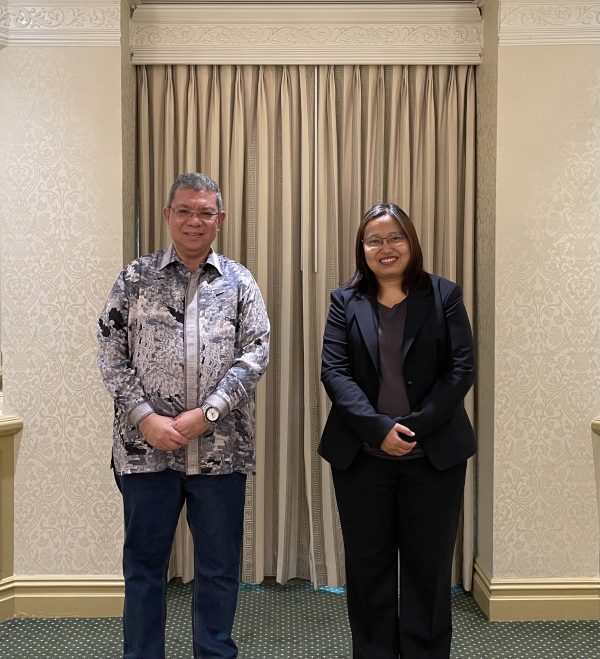
On the weekend, Malaysia’s Foreign Minister Saifuddin Abdullah had an in-person meeting with his counterpart from Myanmar’s National Unity Government (NUG), the first time in which a Southeast Asian official has held a publicly acknowledged meeting with the country’s opposition shadow government.
The “informal” meeting with the NUG’s Foreign Minister Zin Mar Aung took place in Washington, D.C. after the conclusion of the two-day U.S.-ASEAN Special Summit on May 13. Saifuddin wrote on Twitter that during the meeting, he “express[ed] Malaysia’s support and solidarity with the people of Myanmar” and said that his government “stands ready to work towards restoring peace and democracy in Myanmar.” The two also discussed the challenges faced by the NUG, “including humanitarian assistance, technical training, and education for the Myanmar refugees.”
On her own Twitter account, Zin Mar Aung described the meeting as “productive” and said the pair discussed “the dire situation in Myanmar, and how the NUG and Malaysia can work together to restore peace and democracy in Myanmar, including humanitarian assistance and support for the Myanmar refugees.”
The meeting marked a small but significant evolution in the Southeast Asian bloc’s approach to the crisis that has stemmed from the Myanmar military’s seizure of power in February 2021. Since taking up his post in August, Saifuddin has been harshly critical of Senior Gen. Min Aung Hlaing’s lack of efforts to implement ASEAN’s Five-Point Consensus, a loose framework that calls for the “immediate cessation of violence” in Myanmar and inclusive dialogue involving “all parties” to the crisis.
While pledging to support the Consensus, the military government has instead dragged out the process of engagement with ASEAN in order to buy the time necessary to crush the anti-coup resistance. It has also refused ASEAN’s special envoys access to detained leaders of the ousted National League for Democracy government, such as State Counselor Aung San Suu Kyi. All the while, the junta has conditioned its cooperation – and access to the country by the ASEAN special envoys – on the exclusion of its primary opponents, including the NUG, from any ASEAN process.
As Scott Marciel, a former U.S. ambassador to Myanmar, told The Irrawaddy in an interview this week, the main obstacle to progress on the Consensus is the fact that “the junta is refusing to be reasonable at all and make any kind of concessions.” He added, “trying to convince the generals to hold talks with those who oppose them is not really a very useful way of going about things.”
Saifuddin’s push for ASEAN to engage with the NUG reflects a growing recognition of this fact, and the reality that the bloc cannot hope to mediate a conflict while speaking to only one side of the country’s polycentric conflict. His campaign appears to be gaining some traction; during an informal meeting of ASEAN foreign ministers (minus Myanmar) in Washington late last week, current ASEAN Special Envoy and Cambodian Foreign Minister Prak Sokhonn was reportedly open to the idea of including the NUG within ASEAN’s Myanmar diplomacy.
The Malaysian foreign minister’s meeting with Zin Mar Aung also marks a small win for the NUG, which despite its apparent successes in eroding the military junta’s hold on large parts of central Myanmar, has struggled to gain formal international recognition. Khin Zaw Win, the head of the Tampadipa Institute, a Myanmar-based advocacy group, said in emailed comments that the meeting was “a shot in the arm for most opposition forces,” noting that the SAC was “perturbed and made the stock objections.”
Saifuddin’s next challenge is to bring the rest of his ASEAN cohort along with his plan. Whether Malaysia can muster the necessary consensus for a new approach to the Myanmar crisis, and whether even this would succeed in forcing the junta to the negotiating table, are both uncertain. But the only real way for ASEAN to advance a solution to the crisis is for the bloc to stand as one and stop allowing the junta to dictate the terms of its engagement. As Fikry A. Rahman, the head of foreign affairs of the Bait Al Amanah research institute in Kuala Lumpur, noted this week in the New Straits Times, the only route to success is for ASEAN “to exert its political will in demanding the junta’s cooperation.”
One possible means of overcoming the objections of member states like Vietnam, Cambodia, and Thailand, who fear that a more robust stance on Myanmar might compromise the bloc’s “non-interference” principle, is to bracket Myanmar’s membership of ASEAN and make clear that the country’s conflict represents an extraordinary case – one that will not set the sort of regional precedent that they appear most to fear.
While Saifuddin’s push may or may not result in concrete progress, it seems to mark the beginning of the end for the Five-Point Consensus, at least in its current form.
Malaysian FM Meets With Counterpart from Myanmar Opposition Movement
Source: Frappler

0 Comments